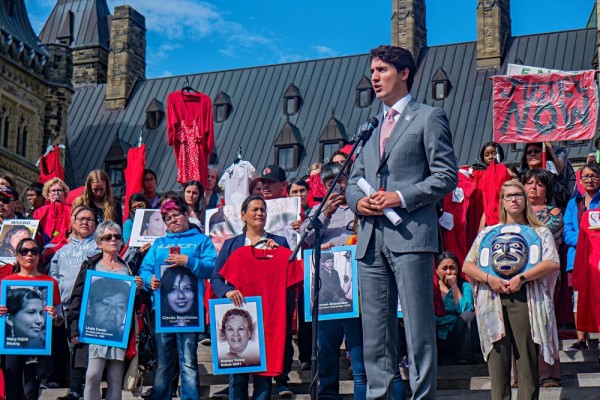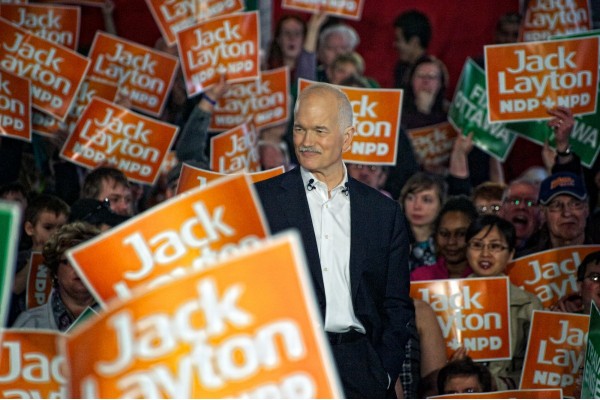We must get rid of the CAQ government. Québec Solidaire is the only alternative

Québec Premier and CAQ leader François Legault. Photo from Twitter.
There is no doubt about the anti-social record of François Legault’s Coalition Avenir Québec (CAQ) government. Its use of immigrants as scapegoats to cover up its failure to meet the needs of Québecers only adds insult to injury. And while demands for investment in health, education, and affordable housing are acute, Legault continues to hand out millions to his friends in the financial world.
A master of communication and political manipulation, the premier is now trying to evade scrutiny of his first term. To that end, he continually presents himself as a great defender of Québec, its people, its language, and its culture. As a result, ethnic communities and migrants in general are targeted as an existential threat to the Québec nation and its future.
In advance of the October 3 provincial election, this article will serve as a critical review of the CAQ government’s policies over the past four years. It is also a call to mobilize and support Québec Solidaire as the only political alternative equipped to improve Québec society and protect the rights of the vulnerable and the environment.
Refusal to seriously address the climate crisis
The CAQ government presented its plan for a green economy (Le plan pour une économie verte) in October 2020. Ignoring the recommendations of the Intergovernmental Panel on Climate Change, Legault adopted a greenhouse gas reduction target of 37.5 percent by 2030, which was set by former Liberal Premier Philippe Couillard in 2018. Yet today, provincial emissions are just 2.7 percent below 1990 levels. Minister of the Environment and the Fight Against Climate Change, Benoit Charette, even confirmed the planned measures would only get Québec halfway towards its already inadequate target. And the government continues to rely on carbon exchange despite its demonstrated ineffectiveness in reducing emissions.
The government boasts today of having banned all oil and gas research and exploration on Québec’s territory. This is a half-truth. The government currently defines natural gas as a profitable transition, or “bridge,” energy for Québec. Hydro-Québec, the Crown corporation that manages the generation, transmission and distribution of electricity in the province, has signed an agreement with Energir that will cost Québec several hundred million dollars and allow the conversion of buildings powered by gas to electricity, while continuing to use gas for winter peak periods.
On the transportation file, the Legault government, in its various budgets, has continued to give priority to highway infrastructure at the expense of public transportation. It has stubbornly defended its tunnel project under the St. Lawrence River linking Québec City and Lévis, in which it is prepared to invest nearly $10 billion. Refusing any major transformation of the dominant modes of transport, Legault sees in the construction of fleets of electric vehicles (with all the dangers of a new “extractivism”) the solution to the climate emergency.
The government talks about “green growth,” but in the name of this growth it continues to distribute public funds generously to businesses without even bothering to check if the they make a dent in emissions reduction targets.
Ultimately, Legault’s government is irresponsible in regard to the climate emergency, yet it has the nerve to tout a leadership role. The actual policies are smoke and mirrors.
Authoritarian mismanagement of the COVID-19 pandemic
The Legault government is currently running an advertising campaign that boasts about its management of the COVID crisis. But the sad reality is that Québec has the worst record of deaths from COVID in Canada, according to official data from l’Institut National de la Santé Publique du Québec (INSOQ). Initially, former Public Health Director Dr. Horacio Arruda claimed that masks were essentially useless, if not dangerous, because they gave a false sense of security.
At the height of the crisis, the number of deaths in residential and long-term care centres (centres d’hébergement et de soins de longue durée) and private institutions for the elderly increased due to the movement of caregivers between different facilities, leading to more than 5,000 deaths in the spring of 2020 alone.
In all settings, access to effective personal protective equipment was a constant struggle. Instead of rectifying the situation, the government blamed individual behaviour for increased disease transmission in an effort to absolve itself of responsibility for failing to make the necessary investments to protect the population.
The pandemic revealed the fragility of the health care system, the dilapidated state of Québec’s schools and the shortage of nurses and teaching personnel across the province.
Insufficient investment in education and health
Last year, the Legault government’s wage offers to public sector workers did not cover the public sector compensation lag behind the private sector. The government claimed it did not have the money to offer more than a two percent annual increase to the what Legault referred to as Québec’s “guardian angels” during the first wave of the pandemic. Many of these employees will see the gap widen and their purchasing power plummet as a result of the new inflationary surge.
Bargaining took place in the context of the pandemic. The government adopted a health emergency law that allowed it to impose decrees that empowered health-network administrations to suspend certain provisions of the collective agreements: cancellation of leaves, modification of schedules, and increases in workload. The government also failed to provide workers with adequate protection. All of this had devastating effects including burnout, resignations, and prolonged illness. As the pandemic laid bare, a general lack of investment in staffing and adequate salary increases has weakened the health sector.
In education, the dilapidated character of many schools is an established fact. While transmission of the virus is mainly by aerosol, the minister of education has dithered on improving ventilation in classrooms, allowing schools to become hotbeds of infection.
The Legault government’s negotiations with women working in childcare were conducted with contempt. It took an exemplary mobilization of union members to wrest concessions from the government. Worse still, the government refuses, despite the significant amounts that Ottawa will transfer, to use that money to extend the childcare network. It persists in supporting unsubsidized private daycare that is profit-oriented and recognized as offering inferior care and education to that provided in the public network (centres de la petite enfance).
Deepening inequality in Québec society
The Legault government is heavily subsidizing the business sector, yet it refuses to tackle tax avoidance and tax havens that are used by companies to avoid paying their fair share. Even the public Caisse de dépôt et de placement du Québec (CDPQ), which admits to investing in tax havens, has not been brought to heel.
At the same time, the government refuses to raise the minimum wage to $18. It also fails to recognize the reality of the housing crisis and the need to invest more in social housing. Meanwhile, the provincial government maintains a welfare rate that does meet recipients’ basic needs.
Claiming to address the effects of inflation, the Legault government is handing out $500 checks to 94 percent of the population (and it’s promising another round of payments if it is re-elected). Through these moves the CAQ government is attempting polishing its image but, in reality, Legault has done virtually nothing to tackle the concentration of wealth in Québec.
The CAQ’s denial of systemic racism
Ghislain Picard, Chief of the Assembly of First Nations Québec-Labrador (AFNQL), denounced the CAQ’s policies toward First Nations. The premier’s refusal to acknowledge systemic racism experienced by Indigenous peoples was seen as particularly unacceptable. The government has rejected proposals made by the AFNQL on youth protection, and denied a request for an exemption from the application of Bill 96 for First Nations.
Premier Legault has even gone to Ottawa to challenge federal legislation recognizing Indigenous community governance capacity with respect to First Nations, Inuit and Métis children, youth and families. The government is also challenging the constitutionality of this legislation in the Supreme Court of Canada.
What’s more, despite the unanimous adoption of a motion submitted by Québec Solidaire in October 2019 calling on the Québec government to negotiate the terms of implementation of the United Nations Declaration on the Rights of Indigenous Peoples, the government has not engaged in meaningful discussion to ensure that the principles in this declaration are applied.
Divisive politics and “identity” demagogy
The identity-based and autonomist nationalism of the Legault government ignores the meaning of true popular sovereignty over Québec’s destiny. The premier is asking for health transfers; the federal government refuses. Then he complains of having insufficient resources for health care; yet he plans to lower taxes.
Legault presents immigration as a mortal danger to French Québec and dares to speak of the “Lousianization” of Québec. Legault is a supporter of a conservative defensive nationalism that augurs further setbacks for Québec, and he covers this policy of resignation with anti-immigration demagoguery that gives legitimacy to xenophobic rhetoric. In this regard, his denial of systemic racism, which is supported by all the columnists of the right, is revealing.
Moreover, the popular majority has been under attack from the Legault government, which is now trying to hide its conservative offensive behind identity-based nationalism, which it openly displays as a convenient way to get more votes.
In this electoral campaign, the social and political left must highlight as much as possible the disastrous record of this government. Its return to power will allow it to continue to deny the climate emergency, to attack the past gains of the popular majority, to channel wealth to the richest segments of society, and to perpetuate its policies of division.
Gabriel Nadeau-Dubois marches with supporters, May 1, 2021. Photo from Twitter.
Québec Solidaire: the only alternative to neoliberal policies
The two major parties that have dominated the Québec political scene for more than thirty years—the Liberal Party and the Parti Québécois—are now on their last legs. The wear and tear of the corrupt Liberal Party paved the way for a new neoliberal political vehicle. At the same time, the CAQ has taken over the identity-based nationalism that the PQ had previously promoted.
Faced with the anti-worker, anti-social and anti-immigrant policies of the CAQ, Québec Solidaire represents the only alternative. To fight the nationalist right, it will be necessary to put forward a socialist, feminist and inclusive project of independence and progressive social change. Québec Solidaire is the only party built on these principles. We must promote them.
The challenge will be to focus the campaign on the critical issues we face and bring the campaign back to our home ground. The challenge for Québec society is not just to defeat the CAQ government and take power, but to build Québec Solidaire as a party that combines parliamentary activity with the strengthening of popular movements that resist neoliberal policies and aspire to social and national emancipation for Québec.
The election of a Québec Solidaire government can only be achieved in symbiosis with popular mobilization for social change. Otherwise, we will remain locked in a political framework where the limits are imposed by the banks, corporations and neoliberal media and think tanks.
The promotion of Québec’s independence must be central to this perspective. Can we imagine for a moment the achievement of popular control of the economic and legal levers of power while remaining confined within the institutional framework of Canadian imperialism and subject to the pressure that corporations exert in Québec? A constituent assembly and the accession to a sovereign Québec are the only way to reconstitute an egalitarian foundation on which to build this new society.
The record of neoliberal government in Québec, Canada and abroad has brought our planet to the brink of collapse. The logic of profit is contrary to any project of planning that respects the environment. Our struggle in Québec must inevitably be integrated into a perspective of solidarity with progressive movements across the country and around the world.
Many of the elements of the party’s platform adopted in December of last year speak to that:
- Emissions reduction of at least 55 percent from 1990 levels by 2030, approaching as far as possible the 65 percent target.
- Nationalization under regional control of all industrial sectors that produce renewable energy.
- Strengthened protection for tenants against “renovictions” and other abusive practices.
- A public inquiry into systemic racism and the establishment of an “Equal Employment Opportunity Program.”
- A constituent assembly in the government’s first mandate, with an invitation to Indigenous peoples to participate.
- Make September 30, the National Day for Truth and Reconciliation, a holiday for all Québecers.
- Critical re-examination of the international economic and military agreements and conventions concluded by Canada.
- Development of wildlife corridors and adoption of minimum standards for the treatment of farm animals.
- Respect of workers’ rights to bargain freely, without recourse to lockouts or special laws. Strengthening of occupational health and safety legislation and the anti-scab law.
- The right to vote in municipal elections for immigrants with permanent residence.
- Particular attention to abortion rights here and abroad and solidarity with struggles for those rights.
Will immigration—the invention of an imaginary threat—be the key issue at the ballot box?
Legault’s entire body of work—Bill 21, Bill 96, his statements on Roxham Road, to which the Parti Québécois adhered, and his recent assertion that Québec risks becoming like Louisiana if the province does not exert greater control over immigration—all point in that direction.
Québec Solidaire has all that is needed to respond effectively. We are the only party that can counter this hateful propaganda and we have many allies in both civil society organizations and in the broad population. We must be prepared to deal with this situation and we must do everything possible to bring the political debate to confront the real political issues in this province.
Our victory will be measured by our ability to get more people to understand the urgent need to change the very foundations of this society, to join with Québec Solidaire, and to understand parliamentary work as one instrument towards achieving this, but not an end in itself.
Edited with additional content by David Mandel.
André Frappier is a regular contributor to CD and a member of the magazine’s coordinating committee. He also serves on the editorial board of the online weekly Presse-toi à gauche and has been a member of the FTQ Montréal Labour Council for many years.










